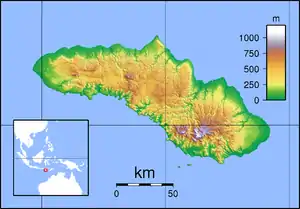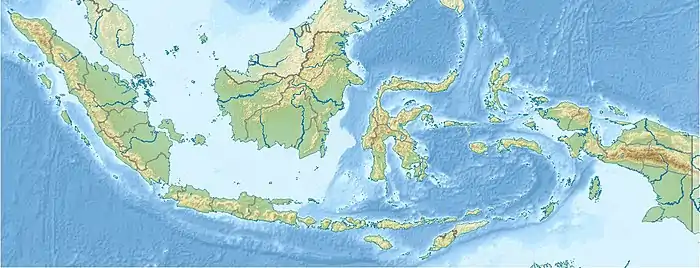| Sungai Wanokaka Wano Kaka, Luku Wonokaka | |
|---|---|
 Lokasi muara  Wanokaka River (Indonesia) | |
| Location | |
| Country | Indonesia |
| Physical characteristics | |
| Source | Manupeu Tanah Daru National Park |
| • location | Sumba, East Nusa Tenggara |
| • elevation | 500 m (1,600 ft) |
| Mouth | Indian Ocean |
• location | West Sumba Regency |
| Length | 80 km (50 mi) |
The Wanokaka River[1] is a river in Sumba island, Province of East Nusa Tenggara, Indonesia.[2] It is located a few kilometers south of Waikabubak, with the District of Wanokaka (Wanukaka), east of the District of Lamboya.[3]
Hydrology
The Wanokaka River flows from east to west before turning to the south into the Indian Ocean at a length of 80 km.[4] The upstream is at the hills Manupeu Tanah Daru National Park, village of Liangudongo, Konda Maloba Utara, District of Katikutana, Central Sumba Regency and discharges into Indian Ocean near Wanokaka Beach in the village of Desa Waihura, District of Wanokaka, West Sumba Regency. The river is famous for two waterfalls, namely Matayangu and Lapopu waterfall.[5][6]
Tributaries
Some tributaries flow to this river among others: the Labariri River, Lahihagalang River, Kerimaraga River, Kihi River, Lakaraha River, Waikajelung River, Lokomara River, and Katamawai River.
Geography
The river flows along the southern area of Sumba with predominantly tropical savanna climate (designated as As in the Köppen-Geiger climate classification).[7] The annual average temperature in the area is 24 °C. The warmest month is April, when the average temperature is around 26 °C, and the coldest is January, at 22 °C.[8] The average annual rainfall is 1731 mm. The wettest month is December, with an average of 356 mm rainfall, and the driest is August, with 10 mm rainfall.[9]
| Luku Wonokaka | ||||||||||||||||||||||||||||||||||||||||||||||||||||||||||||
|---|---|---|---|---|---|---|---|---|---|---|---|---|---|---|---|---|---|---|---|---|---|---|---|---|---|---|---|---|---|---|---|---|---|---|---|---|---|---|---|---|---|---|---|---|---|---|---|---|---|---|---|---|---|---|---|---|---|---|---|---|
| Climate chart (explanation) | ||||||||||||||||||||||||||||||||||||||||||||||||||||||||||||
| ||||||||||||||||||||||||||||||||||||||||||||||||||||||||||||
| ||||||||||||||||||||||||||||||||||||||||||||||||||||||||||||
Uses
The Wanokaka River is utilized for irrigation with Lahikaninu Weir in West Sumba Regency.
See also
References
- ↑ Following Indonesian official geographical naming guide for.
- ↑ Luku Wonokaka at Geonames.org (cc-by); Last updated 17 January 2012; Database dump downloaded 27 November 2015
- ↑ The Southwest of Sumba. Diakses 10 December 2018
- ↑ (in Indonesian) Nama dan Panjang Sungai di Provinsi Nusa Tenggara Timur
- ↑ Indonesia Kaya. "Terpesona Oleh Biru dan Jernihnya Air Terjun Lapopu - Situs Budaya Indonesia". indonesiakaya.com. Retrieved 10 December 2018.
- ↑ Kompas Cyber Media. "Melancong ke Sumba, Kunjungi Lapopu, Air Terjun Tertinggi di NTT". Kompas.com. Retrieved 10 December 2018.
- ↑ Peel, M C; Finlayson, B L; McMahon, T A (2007). "Updated world map of the Köppen-Geiger climate classification". Hydrology and Earth System Sciences. 11 (5): 1633–1644. doi:10.5194/hess-11-1633-2007.
- 1 2 "NASA Earth Observations Data Set Index". NASA. 30 January 2016.
- ↑ "NASA Earth Observations: Rainfall (1 month - TRMM)". NASA/Tropical Rainfall Monitoring Mission. 30 January 2016.